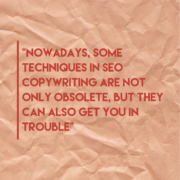Nowadays, some techniques in SEO copywriting are not only obsolete, but they can also get you in trouble. With Google frequently changing its search algorithm, it’s hard to tell what techniques are good, and which are bad. And as more and more businesses become digital, especially in New Braunfels, it’s easy to get caught up in the many myths of running a site with successful SEO. Here are 14 common mistakes made in SEO copywriting (or techniques that used to be good, but aren’t anymore)
Table of Contents
1. Using anchor text with keywords
Nowadays, you’ll get penalized for using this old technique of having anchor texts with keywords.
In its “Link Scheme” document, Google bans this usage, saying that optimized anchor text (using keywords that can be highly ranked) violated their guidelines. Instead, use safe anchors like naked URLs, branded URLs, and long phrases.
2. Not customizing strategies
“Not customizing your SEO strategies can be detrimental to your site,” says Oliver Bailey, a copywriter at Writemyx and Australia2write. “All clients you work with come from different industries, different mindsets, etc.; and they may communicate differently than how you do. Your best bet is to look through their published content, find out what specific copywriting technique that they use when writing the content, and then use that as a guide when you make your copy. Otherwise, readers will question your client’s credibility, when the content is flawed to where they believe that someone else wrote it.”
3. Not doing research
When copywriting your client’s content, know everything about their products/services, prospects, and who their customers are, so that you can say the right things, and use the right keywords. You can even use a keyword planning tool, and it’ll show you what keywords your readers use when Googling so that you can use these in your copy.
4. Poor-quality links
Link-building was and still is, essential for SEO copywriting. However, building low-quality links or purchasing backlinks can get you penalized nowadays.
To make sure that you’re putting out good content, be sure that the backlinks are relevant. And, don’t worry about how many links you’re building, because in this case, quality matters more than quantity.
5. Too many keywords
It’s good to have the right keywords, but not too many. Your audience should be people, not machines. Where’s the fun in talking to machinery anyway?
6. Building links fast
Building too many links in a fast pace can get you ranked higher… only for a short time. Imagine getting a quick boost of energy from a caffeinated drink, and then feeling the crash later – the same can happen with links.
Try building links at your own comfy pace, and build them to where they make sense so that you don’t upset Google’s algorithms.
 7. Heavily relying on writing tools
7. Heavily relying on writing tools
Although you may use writing tools like Grammarly and Hemingway to help you catch spelling and grammar errors (and also text that may be flagged for plagiarism) before publishing, but these tools aren’t perfect. In fact, they may be doing more harm than good every once in a while.
So, it’s best if you read your work aloud, as you proofread it. Make sure that all errors are accounted for, and that your work makes sense when you read it.
8. Writing mediocre content
As you make sure that your work makes sense, make sure that it’s not mediocre.
“Anyone can create a website, and write gibberish on there,” says Noah Allen, a health writer at Britstudent and Nextcoursework. “In fact, people think that anything sells online. However, if your site doesn’t make sense, then you’ll lose readers. Instead, Copywrite something more detailed, something that draws people in without sounding amateur.”
9. Focusing too much on link-building
Building too many links will no longer keep your site afloat. In fact, people are now turning more to social media than links to follow a company or brand. So, why spend so much time link-building, when you can build up social media profiles? In this way (especially in this day and age), you’ll attract more people to the site.
10. Too Many Pages
Adding too many pages to your site won’t help you rank well at all. What’s worse is that Google is now using Panda to target sites that are low-quality. So, if you have too many low-quality pages, then you’ll get flagged. Therefore, create high-quality content, not a million pages just because.
11. Sounding like a telemarketer
People don’t like to be sold to or hear the same tired infomercial script from a telemarketer. They want quick solutions.
Therefore, as you work on SEO copywriting, be sure to speak their language – get through to them as if you were friendly, not persistent and robotic. Once the reader is confident that you’ll solve their problems, you can then tell them about the features of the product/service that you’re promoting.
12. Having duplicate content
Having duplicate content, or letting authority sites republish your content, can instigate a Panda penalty from Google. Be sure to use a canonical tag that will point back to your URL, so that you don’t get flagged for duplicate content.
13. Too many words
Verbiage and statements can get out of hand if you don’t know how to handle them. This is especially common with novice wordsmiths, as they tend to be wordy in their written approach, as a means to sound “smart”… when in reality, it sounds pretentious and complicated.
Instead, try to write in a way that is 8th-grade comprehensive. And, get someone you trust to read your copy so that you both can determine what parts in the text needs clarification.
14. Buying links (BIG NO-NO!)
Buying links are a bad thing if you’re on a tight budget. In fact, there’s no good in buying links that will only attract bots, which can manipulate rankings, and cause Google to get suspicious about your site.
So, avoid buying links, if possible.
However, if you buy links, make sure that you can no-follow them. This way, search engines won’t count the links, and you won’t damage your SEO, while still getting traffic and revenue from it.
Conclusion
When done correctly, SEO copywriting can not only help you boost rankings, but it can get more readers to act. As long as you use the right terms, and hook them with good content, you’ll start seeing the right results from it.
Have you been searching for the best Seo Copywriter available now? Here is our copywriting agency’s collection of the top Seo Freelance Copywriters currently specialized.
Continue Reading: 8 steps to success with SEO copywriting
 About the Author
About the Author
Michael Dehoyos writes and edits for PhD Kingdom and Academic Brits. As a content marketer, he helps companies improve their marketing strategies. He also contributes to numerous sites and publications, including Origin Writings.

 MistakestoavoidinSEO-copywritercollective
MistakestoavoidinSEO-copywritercollective
